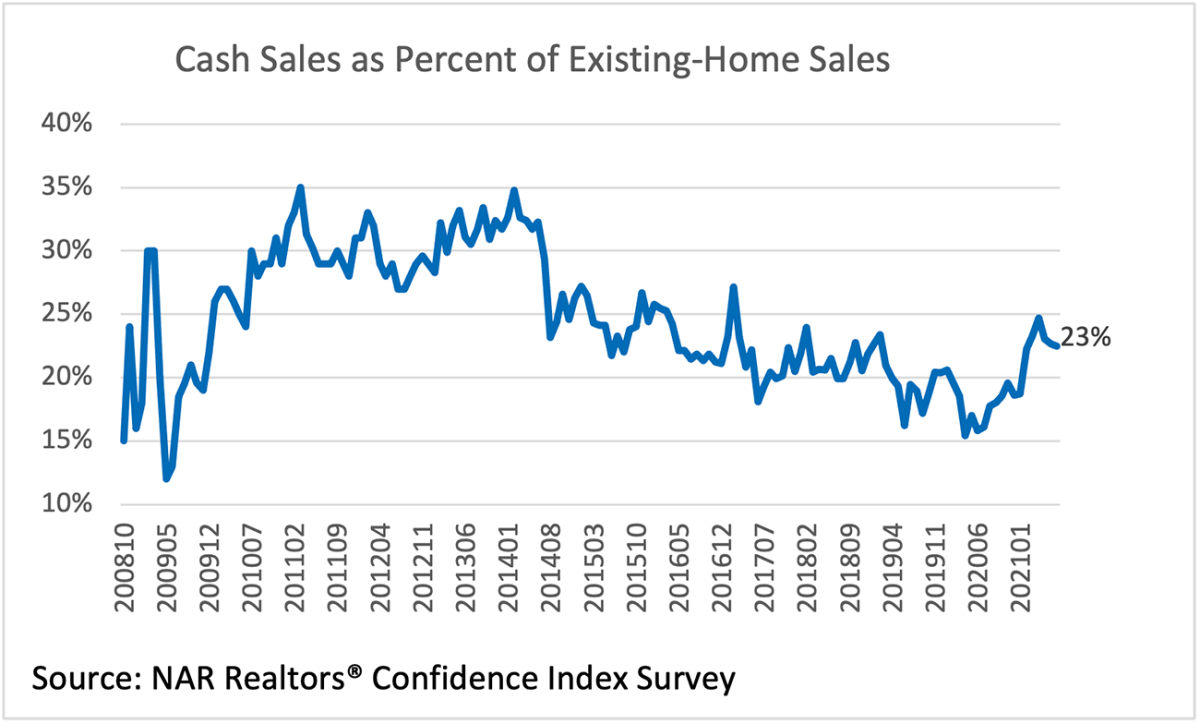
Increasing Role of iBuyers in Cash Offers
The rise of individual home purchasers making all-cash offers has been driven by intense competition from instant buyers (iBuyers) who make instant cash offers like OpenDoor, Redfin Now, Zillow Offers, Keller Offers and many other companies or front-facing websites that offer to quickly purchase the properties for cash (SellHouseCash.com, FastHomeOffer.com, SameDayHomeSale.com, BAMHomeBuyers.com, ExpressOffers.com, AmericanFastHomeBuyers.com).
However, new models are developing where the institutional buyers are not buying the property for their account but purchasing the property for the buyer or providing cash for the buyer to make an offer. The objective is to increase the competitiveness of the buyer's offer by enabling the buyer to offer cash or assuring the seller that if the buyer can't find mortgage financing, the institutional buyers will buy the home for cash.
OpenDoor launched its cash-backed offer program3 on March 4, 2021, whereby it backs up the buyer's offer with a cash offer to the home seller if the buyer fails to secure financing by the closing date. Essentially, the OpenDoor cash-backed offer provides the buyer more time to obtain mortgage financing while closing on a home and also gives assurance to the seller of a home that the sale will close. If the buyer is not able to secure financing, then OpenDoor purchases the home for the buyer and holds the home for 120 days at no cost to the buyer with a fee of 1% of the purchase price. If the buyer is not able to secure financing and wants to hold the home for another 120 days, the buyer pays OpenDoor 0.02% per day of the purchase price. In the table below, I calculated the cost for the buyer. Assuming that OpenDoor purchases the house for the buyer and the buyer needs an additional 120 days to secure financing, the total cost on a $300,000 is $10,200, or 3.4% of the purchase price.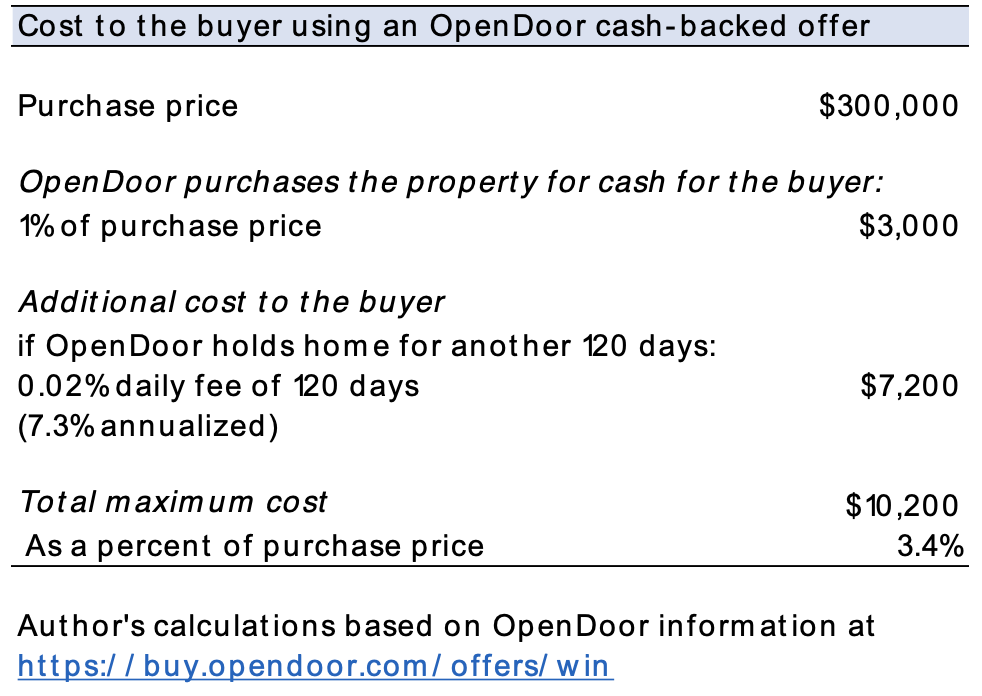
Ribbon purchases the home from the seller for cash on the buyer's behalf if the buyer is not able to secure mortgage financing. Similar to OpenDoor, the Ribbon Offer provides the buyer more time to obtain mortgage financing while closing on a home and also gives assurance to the seller that the sale will close. Ribbon's fee is written into the purchase contract and ranges from 2.0% in North Carolina, South Carolina, and Texas to 2.4% in Georgia and Tennessee, and up to 2.75% in Florida. Ribbon holds the property for up to 180 days and if the buyer is able to secure financing, the buyer repurchases from Ribbon at the same price. However, if the buyer is able to finance an all-cash purchase and does not need Ribbon to purchase the property for cash, the Ribbon fee is 1% of the purchase price (but the full fee must be deposited initially, and the buyer then just gets a credit that goes towards the buyer's closing cost).
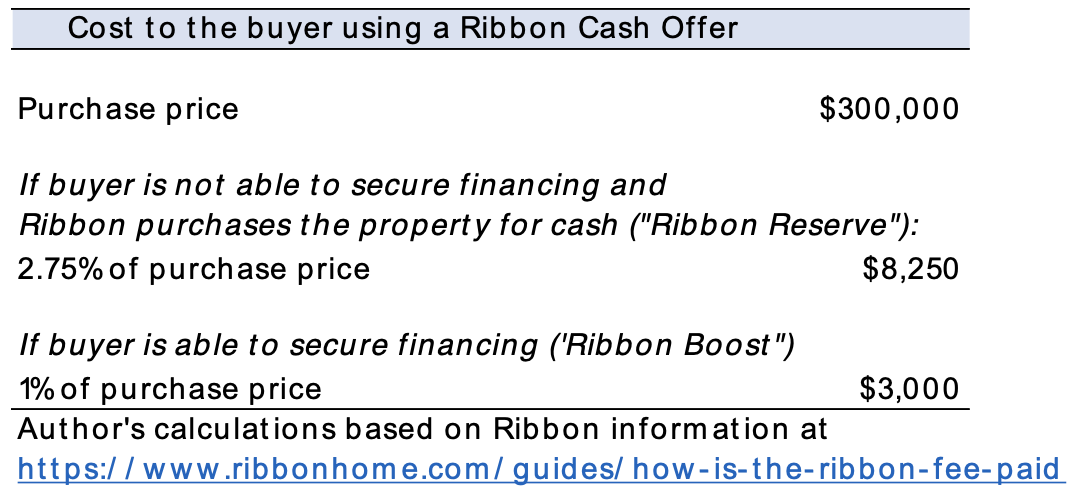
Accept.inc is a lender, and its business model is to prequalify buyers for a cash loan to make a cash offer. Approval can happen as quickly as in 72 hours. Once the lender is approved, the lender can submit an all-cash offer with Accept.inc's proof-of-funds. Once the all-cash offer wins, the home is purchased from the seller using Accept.inc's cash. Once the buyer closes on a loan, the home is then sold back to the buyer at exactly the same price that it was purchased for, with no additional costs or markups. So essentially, Accept.inc is providing an all-cash bridge financing for the buyer so they can close on a home competitively.
There are no fees to have a cash approval, but it is most likely that those who get a cash approval have strong credit. The Accept.inc website notes that there can be several rounds of documentation required, especially among buyers with more complex financial positions, such as those who are self-employed, who should expect to be asked to submit a more extensive list of documents. Currently, Accept.inc only operates in Colorado.
Is the Cost of Obtaining a Cash-backed Offer Worth It?
Based on the calculations above, the cost of obtaining a cash-backed offer or cash offers is not much higher than the 3.7% to 4.4% average percent above the list price that buyers have already been offering to sweeten their offer, according to figures derived from NAR's monthly REALTORS® Confidence Index Survey. Moreover, cash-backed or cash offers give assurance to the seller that there is a ready institutional buyer who will purchase the home should the buyer not be able to secure mortgage financing.
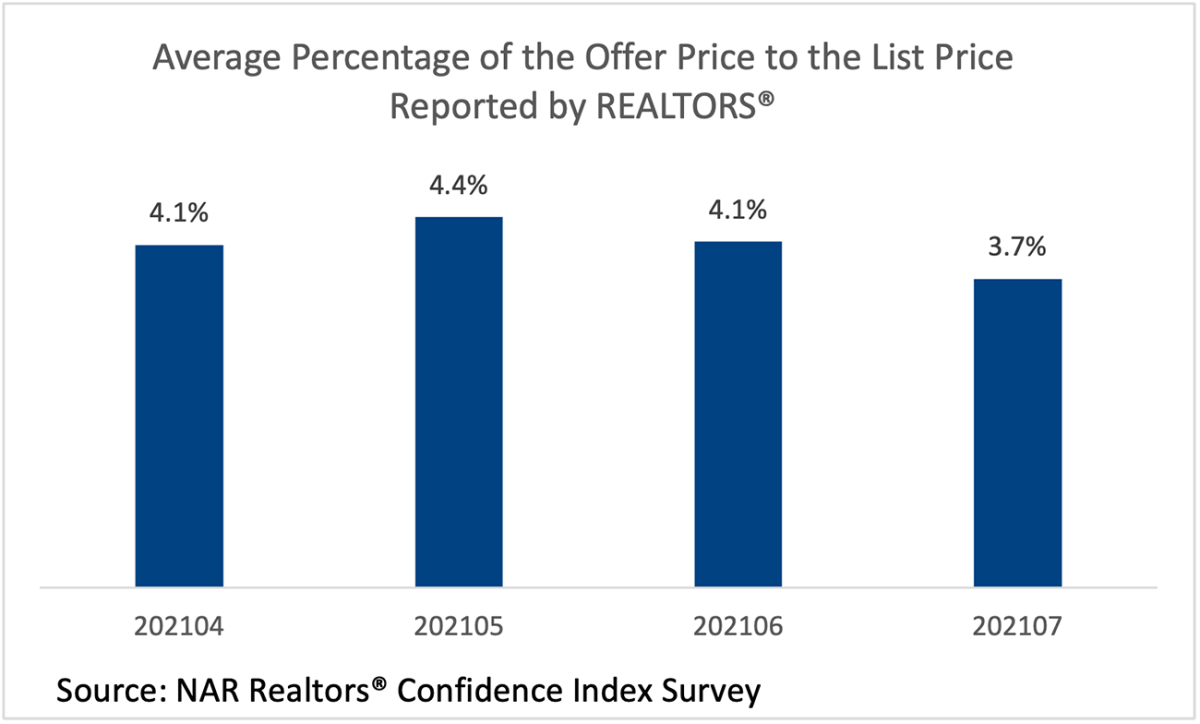
Cash-backed Offers from iBuyers/Fiin-tech Companies Likely to Grow Due to Tight Supply; Will Tap into First-time Buyer Market
Currently, for those Realtors® who have had iBuyers for the homes they sold, 2% of their transactions are to these types of buyers.
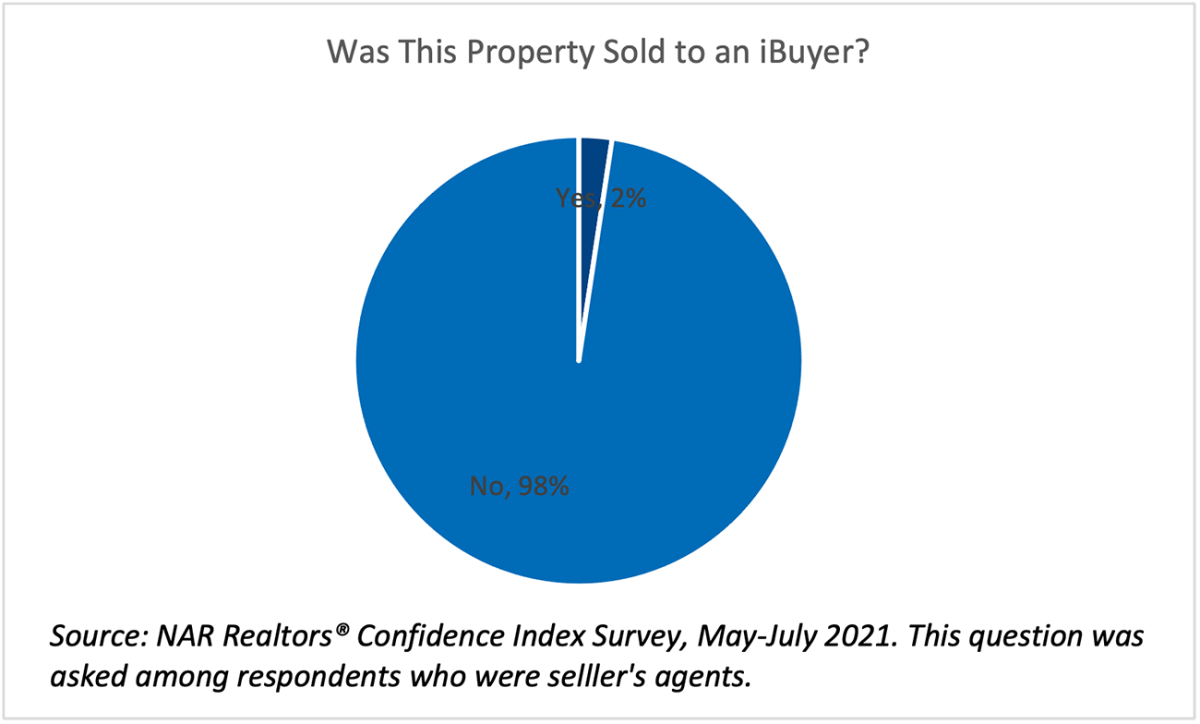
The role of fin-tech companies or iBuyers in providing cash-backed buyer offers or cash financing will likely only increase in the future to fill the need for buyers to become competitive in a market that is likely going to face a limited supply of homes for at least the next 10 years. There is a gap of 6.8 million underbuilt homes over the past 20 years, according to NAR/Rosen Consulting Group study. I also estimate that the housing supply gap as of June 2021 is at 1.85 million, which is the difference between the number of single-family and existing homes available at the end of the period for sale (1.536 million) and the supply needed at the current pace of demand that is equivalent to six months of supply (3.275 million).
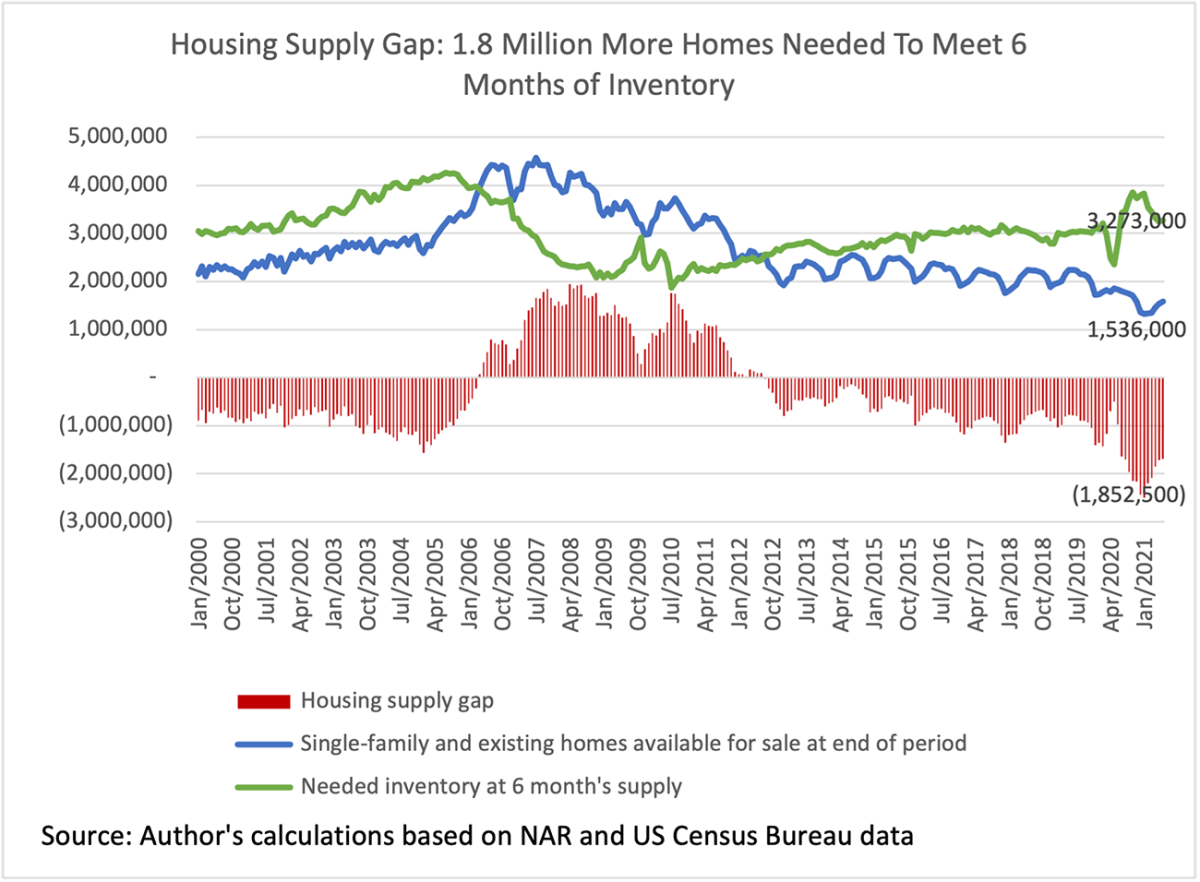
First-time buyers have been edged out of the market in a highly competitive environment. As of July 2020, the share of first-time buyers fell to 30% from 34% one year ago. Institutional buyers or fin-tech companies can improve the playing field for buyers who have excellent income and credit profiles (that iBuyers and fin-tech companies will likely target) but who lose out to non-first-time buyers who have the cash to do an all-cash offer. As shown in the data visualization below, homebuyers who purchased a home 10 years ago in current high-cost markets like San Francisco, San Jose, Los Angeles, San Diego, and Seattle have built up equity of over $400,000 that could be used to purchase less expensive properties in other markets.
1 iBuyers are companies that use technology to make an offer on a home instantly based on automated valuation of the property. See https://www.opendoor.com/w/guides/what-is-an-ibuyer
2 Fin-tech companies are companies that leverage the power of technology and data to provide financial services to consumers and businesses. See https://www.thestreet.com/technology/what-is-fintech-14885154
3 OpenDoor, https://www.opendoor.com/w/blog/opendoor-introduces-cash-backed-offers









